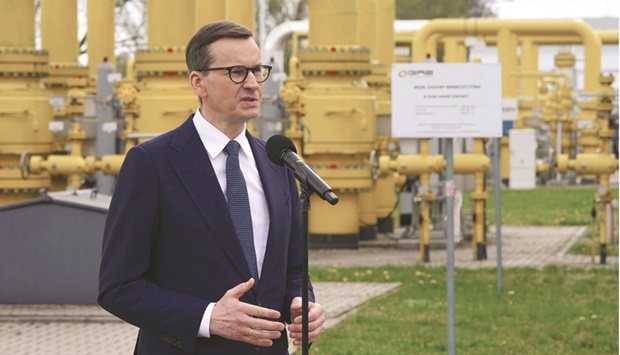Russia halted gas supplies to Bulgaria and Poland yesterday for rejecting its demand for payment in roubles, taking direct aim at European economies in a move that also exposed confusion in the EU on how to respond to Moscow’s invasion of Ukraine.
The decision, denounced by European leaders as “blackmail”, comes as Russia’s own economy wilts under sweeping international sanctions and as Western countries ramp up arms shipments to help Ukraine fend off a new Russian assault in the east.
Ukraine reported yesterday that Russian troops had made gains in several villages there. Russia reported a number of blasts on its side of the border, and a blaze at an arms depot. Kyiv called the explosions “karma”.
Ukraine’s prosecutor-general said Russian forces had used tear gas and stun grenades to disperse a pro-Ukraine rally in the southern city of Kherson, the first big urban centre seized by Moscow after the February 24 invasion.
Gazprom, Russia’s gas export monopoly, said it had “completely suspended gas supplies” to the Polish and Bulgarian gas companies “due to absence of payments in roubles”, as stipulated in a decree from President Vladimir Putin that aims to soften the impact of sanctions on the Russian economy.
Polish President Andrzej Duda said the move violated “basic legal principles”. Bulgarian Energy Minister Alexander Nikolov said gas was being used as a “political and economic weapon”.
Kremlin spokesperson Dmitry Peskov said Russia remained a reliable energy supplier and denied it was engaging in blackmail. He declined to say how many countries had agreed to switch to paying for gas in roubles but other European customers said gas supplies were flowing normally.
European Commission President Ursula von der Leyen called the cut-off “yet another attempt by Russia to use gas as an instrument of blackmail”.
But the Commission has also said the EU’s gas buyers can engage with Russia’s payment scheme provided certain conditions are met.
Germany’s main importer, Uniper, said it could pay without violations. Austria and Hungary, among others, have also indicated they will take this route.
However, ambassadors from the EU member states asked the Commission for clearer guidance on whether sending euros to Gazprombank would amount to a breach of sanctions.
Poland and Bulgaria are both former Soviet-era satellites of Moscow that have since joined the EU and Nato. Poland has been one of the Kremlin’s most vocal opponents over the war.
Bulgaria has long had warmer relations with Russia, but Prime Minister Kirill Petkov, an anti-graft campaigner who took office last year, has denounced the invasion of Ukraine. He was due in Kyiv yesterday to meet President Volodymyr Zelensky.
Bulgaria and Poland are the only two European countries with Gazprom contracts due to expire at the end of this year, which meant their search for alternative supplies was well under way.
The cut-off comes as the weather turns warmer and the need for gas heating dwindles, and so is unlikely to lead to immediate supply cuts to consumers. Poland says it has ample gas in storage, and Bulgaria, a comparatively small consumer, is seeking alternative supplies from Greece and Turkey.
But if the cut-off lasts for many months or spreads to other countries, it could cause havoc for a continent that relies on plentiful and cheap Russian gas to heat homes, power factories and generate electricity.
Kyiv has been urging EU countries to stop funding Moscow’s war effort by halting imports that bring Russia hundreds of millions of dollars a day. Germany, the biggest buyer of Russian energy, hopes to stop importing Russian oil within days, but weaning itself off Russian gas is a far bigger challenge.
Economy Minister Robert Habeck said a Russian energy embargo or blockade would tip Germany, Europe’s largest economy, into recession. At the same time, a Russian economy ministry document indicated that Russia’s economy could shrink by as much as 12.4% this year, as sanctions bite.
Meanwhile, blasts were heard early yesterday in three Russian provinces bordering Ukraine, authorities said, and an ammunition depot in the Belgorod province caught fire.

Polish Prime Minister Mateusz Morawiecki gives a press statement on the gas halt from Russia at the gas transmission point in Rembelszczyzna near Warsaw yesterday. (AFP)
